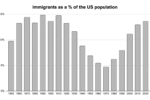
(Outlet: Forbes) The author of a new book finds immigrants are not villains or victims but people who strive to better their lives and contribute to a vibrant society. The book comes at a time when immigration ranks among the country’s most contentious issues. Stuart Anderson, Senior Contributor at Forbes, interviews economist Zeke Hernandez. …Read More











